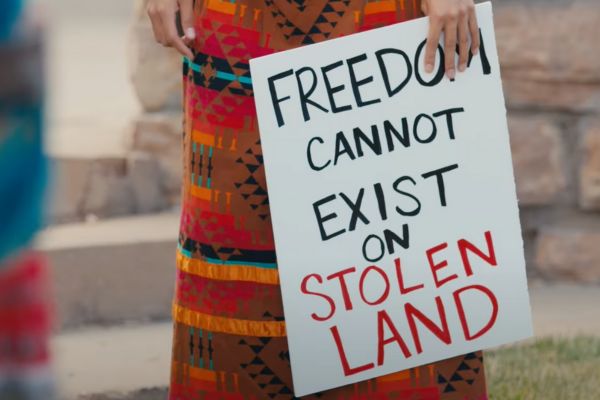
- Details
- By Jenna Kunze
The film was written and narrated by Oglala poet Layli Long Soldier, co-directed by Jesse Short Bull (Oglala Lakota) and Laura Tomaselli, and produced by Sarah Eagle Heart (Oglala Lakota), Mark Ruffalo, and Marisa Tomei.
The 118-minute documentary traces the history and controversy around the Black Hills from the arrival of the first Europeans in 1492, to the Indian Wars of the 1800s, to the Fort Laramie Treaty of 1868, when the U.S. government formally recognized the Black Hills as part of the Great Sioux Reservation set aside for exclusive use by the Sioux people. But that treaty, like many others, was broken, which gave way to “the creation of a most ironic shrine to white supremacy, Mount Rushmore,” the documentary’s description reads.
“Lakota Nation vs. United States” first screened at the Tribeca Film Festival in New York City last June. Native News Online was present for the viewing and caught up with director Jesse Short Bull afterward. Short Bull said he found himself emotional several times throughout the screening.
“I never thought I would broach this subject because it’s very large and there’s people that have powerful invested emotions,” Short Bull told Native News Online. “But I will say that, in the creative process, if you put yourself out there, things start to happen if you just have faith.”
Actor and activist Mark Ruffalo, known for playing the Incredible Hulk in several Marvel films and TV series, produced the film.
Ruffalo previously told Native News Online that he first became involved with Indigenous issues fighting fracking in New York state in 2011. He attended the disinterment ceremony for the repatriation of nine Rosebud youth in 2021 at the site of the nation’s first off-reservation Indian boarding school in Carlisle, Pennsylvania. Ruffalo said he was inspired to attend the ceremony to bring attention to the “ugly” history of boarding schools little known to many Americans.
“When you talk to Native people, within the first ...10 minutes, you’ll hear stories about the boarding schools,” Ruffalo told Native News Online at the disinterment ceremony. “This is an open wound that America has to heal.”
“Lakota Nation vs. United States,” which explores another ugly and untold American history, will open in theaters in New York on July 14 and in Los Angeles on July 21.
More Stories Like This
From Dishwasher to Award-Winning Chef: Laguna Pueblo's Josh Aragon Serves Up Albuquerque's Best Green Chile StewRob Reiner's Final Work as Producer Appears to Address MMIP Crisis
Vision Maker Media Honors MacDonald Siblings With 2025 Frank Blythe Award
First Tribally Owned Gallery in Tulsa Debuts ‘Mvskokvlke: Road of Strength’
Zuni Youth Enrichment Project and Partners at Ho’n A:wan Productions Launch 8th Annual Delapna:we Project
Help us defend tribal sovereignty.
At Native News Online, our mission is rooted in telling the stories that strengthen sovereignty and uplift Indigenous voices — not just at year’s end, but every single day.
Because of your generosity last year, we were able to keep our reporters on the ground in tribal communities, at national gatherings and in the halls of Congress — covering the issues that matter most to Indian Country: sovereignty, culture, education, health and economic opportunity.
That support sustained us through a tough year in 2025. Now, as we look to the year ahead, we need your help right now to ensure warrior journalism remains strong — reporting that defends tribal sovereignty, amplifies Native truth, and holds power accountable.
 The stakes couldn't be higher. Your support keeps Native voices heard, Native stories told and Native sovereignty defended.
The stakes couldn't be higher. Your support keeps Native voices heard, Native stories told and Native sovereignty defended.
Stand with Warrior Journalism today.
Levi Rickert (Potawatomi), Editor & Publisher


